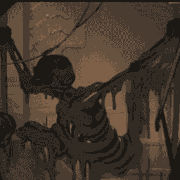JaucheCharly posted:It's a long way from Mein Kampf (that only a few people read completely, and not found that it was utter bullshit) and the milestones that Sunshine outlined. I mean, do you take political banter at face value? Apparently not even enough jews did. I think I just made the distinction you seem to be inviting me to make. Although I think the point about Mein Kampf is that it wasn't actually just 'banter' - not that everyone was to know that! In any event, my point is simply that nobody has the right to claim that the brutal persecution of the Jews came out of the head of Zeus. The surprise was just how bad it was. Disinterested fucked around with this message at 12:34 on Apr 20, 2015 |
|
|
|
|

|
| # ? Jun 7, 2024 06:15 |
|
I don't think that this is just a conversation between us two here. What I said wasn't covered in the longer post, but what Koba asked. You post that the whole thing was plain to see and the only question was how bad, and I add that it wasn't a step from 0 to 100 as his post suggests.
|
|
|
JaucheCharly posted:I don't think that this is just a conversation between us two here. What I said wasn't covered in the longer post, but what Koba asked. You post that the whole thing was plain to see and the only question was how bad, and I add that it wasn't a step from 0 to 100 as his post suggests. Ya true enough.
|
|
|
|
|
JaucheCharly posted:Talk is talk and using industrial methods and the means of a modern western state to exterminate people is something else (without precedent before that, mind you). You can sift through antisemitic material of the fin de siécle in Vienna where Hitler was politically socialized and there are the same talkingpoints about getting rid of the jews, exactly the same. His language, social darwinism and imagery came from there, he invented nothing new. These views were a commonplace, and the general population shared them to a certain degree or was congruent (especially the deutschnationale branch of political thought that was very strongly present in the leadership of the Wehrmacht, or i.o.w. the old elites) and payed no attention that somebody might change talk into action. Antisemitic talk and stereotypes played a role of varying magnitude in political life since almost 100 years by then, and not just in Germany. I'm too lazy today to do a full effort post on the long history of people arguing the "functionalist" vs. "intentionalist" positions which is exactly what this thread has just re-discovered. I will say that everything that JC said up there is basically correct, he knows his poo poo, and you should all listen to him carefully. The one thing I would add to all of what he said is to emphasize that you have to recognize how much easier it is to spot ill portents through the 20/20 hindsight of knowing where all this bad poo poo leads. Even the Jewish community and its leaders thought that this was just another moment in history where things would get temporarily really lovely, maybe for as long as a few decades, and then return to the status quo. Pre-Holocaust European Jews were a population that had survived hundreds of eras of persecution, eviction, ghettoization, pogroms, etc. since the middle ages. The historical lesson that many had learned was that in the face of someone like Hitler or Karl Leuger (who most people figured Hitler was a carbon copy of) you were best served by hunkering down, keeping within the community, supporting each other as best you can, and just generally weathering the storm. Full disclosure: I Personally I take a moderated functionalist approach towards the Holocaust. I'm a big fan of Kershaw's ideas of "working towards the Führer" as a working model for how leadership in the Nazi system worked. I'm not an expert in the Holocaust, but I am somewhat of one on German bureaucracy and government structure and Nazi Germany is in many ways a much more amorphous beast than the more rigidly hierarchical systems that both preceded and followed it. That's a lot of what makes it hard to pin down specific proximate causes for a lot of the worst aspects of the Nazi regime or to talk about broadly unifying principles (e.g. a "National Socialist philosophy").
|
|
|
Cyrano4747 posted:The one thing I would add to all of what he said is to emphasize that you have to recognize how much easier it is to spot ill portents through the 20/20 hindsight of knowing where all this bad poo poo leads. Even the Jewish community and its leaders thought that this was just another moment in history where things would get temporarily really lovely, maybe for as long as a few decades, and then return to the status quo. Pre-Holocaust European Jews were a population that had survived hundreds of eras of persecution, eviction, ghettoization, pogroms, etc. since the middle ages. The historical lesson that many had learned was that in the face of someone like Hitler or Karl Leuger (who most people figured Hitler was a carbon copy of) you were best served by hunkering down, keeping within the community, supporting each other as best you can, and just generally weathering the storm. Victor Klemperer reported that occasionally Germans would approach him and say things like 'don't let the bastards get you down, I'm sure it will be over soon, the fools can't last much longer' etc.
|
|
|
|
|
achillesforever6 posted:Ugh I have a friend works at the Carnegie Museum and he keeps trying to tell me this stuff about how pre-War Germany was great because of the system that they were setting up for their citizens what with universal health care and vacations and etc (basically everything was going to be dandy for the Germans and how amazing it was they went from 3rd world to 1st world in 5 years). But the thing that galled me was that he claimed at some point Hitler and the German government offered the Jews living in Germany 2 million to move to Poland and the Jewish leaders refused. That has to be complete bullshit. Another hosed up thing is while he agreed that the Holocaust was awful, he told there was a reason for antisemitism being a thing because there was some truth the Jews running all the finances and businesses. Ask your friend about David Irving.
|
|
|
|
Offer your friend 4 bucks to move to Mexico and leave all his possessions behind. If he says no spray some gas on him and if he says anything deny you did anything.
|
|
|
|
I kind of don't want to ask him anything historical because he was also telling me about how awful Nelson Mandela was and how he was a genocidal rear end in a top hat and that maybe apartheid wasn't that bad because look at South Africa now and I'm like "Uh huh yeah let's change the subject and talk about wrestling or dinosaurs buddy". I should have seen the warning signs though as soon as he told me that he was a Jeffersonian Libertarian. Which mean he hates corporations and plutocracy and believes that we should strive for Jefferson's ideal society. So yeah I think I'm just going to talk to him about pop culture stuff and also how good my chances are getting a job at the museum are (he's basically my inside man to the horribly messed up bureaucracy that is the Carnegie Museum of Natural History)
|
|
|
|
Yeah he'd love David Irving.
|
|
|
|
I have a book written in the mid-30s analyzing the ideological foundations of nazism and fascism (the chapter on fascism is basically a thin pamphlet where the author goes "I don't know what the hell these guys are even on about, and evidently neither do they."), and the author says that, given their violent rhetoric, it is surprising that the nazis aren't treating the jews worse. A lot of smart people assumed that people like Hitler, Goebbels, Rosenberg etc were just spouting extremist bullshit to impress the masses.
|
|
|
|
So apparently the United States would actually ship German POWs over the Atlantic all the way to the United States to camps in the mainland US? Why didn't they just keep the German prisoners in camps in Europe once they'd been captured and not go to all that trouble?
|
|
|
|
Kanine posted:Why didn't they just keep the German prisoners in camps in Europe once they'd been captured and not go to all that trouble? They did. My grandfather was in one of these and barely survived. Apparently a lot of prisoners died from malnutrition and/or exposure.
|
|
|
Kanine posted:So apparently the United States would actually ship German POWs over the Atlantic all the way to the United States to camps in the mainland US? Why didn't they just keep the German prisoners in camps in Europe once they'd been captured and not go to all that trouble? The great American tradition of shipping free labour across the Atlantic?
|
|
|
|
|
Kanine posted:So apparently the United States would actually ship German POWs over the Atlantic all the way to the United States to camps in the mainland US? Why didn't they just keep the German prisoners in camps in Europe once they'd been captured and not go to all that trouble? It really discourages escape if you put your prisoners all the way on the other side of the ocean from their homeland and other friendly territory. There's still always going to be some guys who try to escape but the vast majority who have any awareness of geography would recognize it as utterly futile. It also means that you don't have to ship supplies all the way over the ocean to feed and clothe prisoners - cargo space going to Europe is going to be at a much higher premium than on ships making the return journey. And it also means that you can put the labor of PoWs to use for whatever work is allowed by the Geneva Convention, like agriculture.
|
|
|
|
So did that happen? I know about the Japanese internment camps and the government quietly shipping over nazis with valuable scientific knowledge post-war and stuff, but the POW thing is new to me.
|
|
|
|
Pornographic Memory posted:And it also means that you can put the labor of PoWs to use for whatever work is allowed by the Geneva Convention, like agriculture. Or you can just classify your prisoners as "disarmed enemy combatants" and not have to bother with petty bullshit like international laws of war. 
|
|
|
|
There's some interviews with german POWs on the channel "Gedächtnis der Nation" that were in the US, apparently it was pretty good work and pay and comfortable until the US public saw the first images of the KZs.
|
|
|
|
Holy gently caress what a shitshow. They literally just went "Nah they're not actually POWs" and built a big fence around them. I think they're a bunch of raging arseholes for doing it but I'm forced to admit that I seriously don't envy the guy that got told there's without exaggeration a million new prisoners to deal with and the British are taking none of them.
|
|
|
|
There was one German prisoner who escaped and stayed in America under an assumed name until finally revealing the truth 40 years later. http://en.m.wikipedia.org/wiki/Georg_Gärtner
|
|
|
|
jojoinnit posted:So did that happen? I know about the Japanese internment camps and the government quietly shipping over nazis with valuable scientific knowledge post-war and stuff, but the POW thing is new to me. Oh hell yeah they did. They made huge use of the big bag of prisoners we got in North Africa in U.S. agriculture as an example. A lot of the POW camps were in the west and Midwest. The Brits started the whole thing even earlier, sending all their pre-1942 prisoners to Canada. On a more anecdotal level : I grew up in Oregon and there were a couple old camps near my house. A friend of mine had a German grandfather who became a POW in 42. The old guy was basically a farm kid from bumblefuck Bavaria and was blown away by the soil quality on the farm that he got rented to by the govt. After the war he got shipped home, took one look at the bombed out shitshow that 1946 Germany was and spent the next couple years getting his poo poo in order to emigrate back to the U.S. He moved right back to Oregon, settled in, and got on with the business of starting a family and generally living out his days as a U.S. citizen.
|
|
|
|
I've been fascinated with American fascists from the 1930s, like Charles Coughlin. Turns out you can dig up a bunch of his group's old newspapers through some searching. One thing that stands out to me is the similarity to modern conspiracy theory websites: obsessed with communist plots, militaristic phrases (like InfoWars, etc.). Social Justice was obsessed with Jews, and there's lots of victim blaming combined with intellectually dishonest handwringing. So there's articles about "why yes, the Hitlerites are unfairly kicking the Jews, and we feel very bad for them indeed, but we must understand the root causes to prevent it from happening here to the good Jews, who are quite unlike the bad ones ... who control the world's governments and banks!"  https://www.youtube.com/watch?v=9LJkNRHMnPc I keep reading this guy was seriously popular, but I also get the sense that his memory was suppressed by the war for obvious reasons, so people don't quite grasp how dangerous this movement was domestically at the time. What's also amazing is how close he models his persona after Hitler. I also ran across some articles of them beefing with the German-American Bund. Coughlin wasn't a fan of ethnic lobbies which he dubbed "hyphenated Americanism" but he didn't seem to have any problems with their politics. Reading through those newspapers is like a glimpse into that Bioshock game, except very much real. BrutalistMcDonalds fucked around with this message at 18:47 on Apr 21, 2015 |
|
|
|
From all accounts I've heard and read about the POW camps for Germans in the US were actually pretty drat comfortable. They had rec halls, movie theaters, and stuff like that. At some point restrictions got so loose that fraternization between prisoners and local town girls was a sort of open secret.
|
|
|
|
American Fascism is pretty crazy when you get into groups like the Silver Legion of America, the "Silver Shirts", because they're from the Himmler occult side of fascism. William Dudley Pelley, their leader, was big into theosophy and the existence of ascended masters which eventually becomes the bedrock of UFO conspiracy theories of the 50's. The seven degrees of Kevin Bacon for most Western conspiracy theories is the later writings of a Pelley.
|
|
|
|
Can you provide any sources for the reasons for the lack of bombing the camps I could share with friends who are interested?
|
|
|
|
site posted:This isn't technically about Nazis but I'm crossposting here hoping to get lucky... One thing I'd dispute from the Ur-Fascism concept is this: quote:2. Traditionalism implies the rejection of modernism. So if that's modernity, then what was modernism? It was the idea that the traditional world is irreparably damaged, so we're going to build a new, revolutionary and unified world that will restore these bonds between people, end alienation, etc. Modernism proposed a new aesthetic, a new way of living, including music and architecture and so on. And out of that came a slew of revolutionary political movements, including communism and fascism. Another way of putting it is that modernism recognized that repairing or keeping the old order intact wasn't going to work, so we'll build a new order that will provide a meaningful way of life for people like the old one did, though not the same as. We're not going to restore the monarchy, but we're going to build a new system that will give people a sense of meaning and purpose to their lives. Nazism was all about tradition, but it was about revitalizing ancient pre-modern traditions as a means to build a new future. And instead of being opposed to the Enlightenment, I'd say fascism owed some elements to it. For one, fascism was humanist in that it sought to improve the condition of human beings on earth in the here-and-now, whether expressed in mass exercises or youth programs. Eco dismisses this as being kind of superficial, but I think he does that because it doesn't fit his theory. It was way more essential to Nazism than he thinks. But this humanism was a selective and exclusionary humanism -- one that ruled out most other people as human beings and defining it strictly (in the Nazi case) as Germanic people living in harmony inside an organic, unified, collective nation-community, which they believed could be perfected. Exterminating the Jews became part of this community's drive to "improve" itself by essentially detoxifying its "body" of foreign organisms. Like right-wing hippies. This is where the idea of Jews being "parasites" comes from. And it's why whenever you watch those old Nazi movies showing mass exercises, it's actually far more disturbing when you think about it like that. The Holocaust was like an industrial-scale racial decontamination program, if I were to use a euphemistic term. Of course in reality it was mass murder. The larger point is that like other posters said, a lot of Eco can be applied to other political movements. But if we're going to attempt a definition, we need to define fascism down to an element or series of elements that's unique to it, and that *without* those elements, it would not be fascism. Which is why I tend to get irritated by claims (from the left) that fascism is basically just authoritarian capitalism, or something like it. Or (from the right) that fascism = gun control or something nonsensical like that. BrutalistMcDonalds fucked around with this message at 20:38 on Apr 21, 2015 |
|
|
|
GlyphGryph posted:Can you provide any sources for the reasons for the lack of bombing the camps I could share with friends who are interested? This is a big issue that you can dump a lot of words on but the short version is that the major killing centers - think the Aktion Reinhardt camps - were way too far east and did the bulk of the holocausts killing before the west knew what was going on. I forget the exact numbers but it's on the order of 80 percent of the victims were dead by the end of 43. The major killing took place in a relatively short period of time between 42 and 43. The other part of it is limited resources. What is more important, bombing an awful work camp that contributes less than nothing to the bazi war effort or flattening an oil field? Ultimately they decided, once they knew what was going on, that the priority had to be ending the war asap. Despite all that they did bomb camps on occasion especially the ones that were tied into industry. A good chunk of buchenwald got flattened taking out a small arms plant for example.
|
|
|
|
GlyphGryph posted:Can you provide any sources for the reasons for the lack of bombing the camps I could share with friends who are interested? The only source I have seen is on BBC World At War where they are talking to a British officer/Lord (I forget his name) about this and he basically just says that the fastest way to free the prisoners was to win the war as quickly as possible and diverting planes to bomb a camp would just detract from the greater war effort. Also camps were in enemy territory so you can bomb it all you want but all you achieve is some underfed people being stuck in enemy territory and you will also probably inadvertently kill them as well. You still need boots on the ground to liberate a camp.
|
|
|
|
GlyphGryph posted:Can you provide any sources for the reasons for the lack of bombing the camps I could share with friends who are interested? It's the 1940's. There isn't really a such thing as guided munitions for long range bombers and they would have destroyed the camp, with everyone in it, if they bombed it. This is the era of taking out a whole city block to bomb something as large as a factory. Even then, how would they know what buildings to bomb and which ones not to? What makes the barracks overcrowded with prisoners any different looking than the guard barracks or the admin buildings from the sky? Most camps were in wooded areas, designed to be dismantled and covered in trees to erase and hints at their existence. Even then, no one until the end of the war knows about the concentration camps or believes in them until they liberate them. The Nazis were bad but no one really believed they were that bad because the Final Solution was insanity at that point in the war. It defied conventional logic, like most things the Nazis did, so not even the Soviets believed such a thing could happen until they saw it themselves.
|
|
|
|
RocknRollaAyatollah posted:It's the 1940's. There isn't really a such thing as guided munitions for long range bombers and they would have destroyed the camp, with everyone in it, if they bombed it. This is the era of taking out a whole city block to bomb something as large as a factory. Even then, how would they know what buildings to bomb and which ones not to? What makes the barracks overcrowded with prisoners any different looking than the guard barracks or the admin buildings from the sky? Most camps were in wooded areas, designed to be dismantled and covered in trees to erase and hints at their existence. eeeeeeehhhh your heart's in the right place but you've got a number of misunderstandings in here. 1) not everything was area bombing of cities. All jokes aside daylight bombing from altitude was precise-ish. The USAAF wasn't just blowing smoke when they claimed to be able to bomb specific targets from altitude. Yes, if your school was located next door to the ball bearing plant you were kinda hosed, but the city center wasn't necessarily going to eat poo poo if the tank factory in the suburbs got flattened. The limiting factor was really how many casualties you were willing to take and how well defended the target was. There were some remarkable feats of precision bombing done using medium bombers during the war and even the heavies could be utterly devastating in their accuracy if they could get down to 10,000 feet or so. Of course flying that low over a defended city was a very unpleasant prospect. Even so, when they did bomb camps they did a pretty good job of identifying the major targets (usually the factory buildings themselves) and knocking those out. Prisoners died when Buchenwald got hit, as an example, but the small arms factory located there was completely destroyed and never got production up and running again before the war ended. I'm pretty sure we hit the artificial rubber plant at Auschwitz as well, although I'd have to double check that. 2) most of the camps that were in range of allied bombers had been there a damned long time and they made no real attempt to hide them. I can tell you from personal experience that you can see Buchenwald from the middle of Weimar. The structures at these camps were in no way temporary affairs, being made of some pretty good quality masonry. Now, a lot of the housing was built out of wood and was pretty lovely, but the main camp buildings were pretty solid. The oldest of the camps had operated since the mid 30s, and everyone knew about them. That was the whole loving point, they existed as the big black hole that political opponents of the party disappeared into - it's kind of hard to have something be both secret and a visible threat to keep the population in check. Most of those political camps evolved into mixed use camps - again, using the example of Buchenwald it moved from being straight political prisoners to a work camp. 3) not every camp was a death camp, which is what you're thinking of with the places that were built to be dismantled (specifically the Reinhardt camps in that case). As I said before most of those were waaaay east of where US/British bombers could hit them, mostly in E. Poland. Just to continue my above discussion of the permanent nature of many of the camps, Auschwitz (which was also bombed a couple times) wasn't a single camp but a huge camp complex. It included a work camp, a death camp, and a bunch of other sub-camps. 4) The west knew the Holocaust was happening, although as I said before specific intelligence about it got out a little too late to stop the worst of the killing. I forget the exact date, but there were really detailed accounts smuggled out of some of the worst killing centers as early as the mid-war period (I want to say sometime in '43). This information wasn't exactly broadcast to the general public, but it's wrong to say that military leadership was ignorant of the plight of the Jews until GIs started marching into camps in '45. 5) I alluded to this a bit before, but areal recon of industrial targets was elevated to an art by the mid-war period, and the camps were no exception. It wasn't that hard for them to identify what was prisoner housing vs. what was a factory or admin building, for example.
|
|
|
|
I think the main question is, what would bombing the camps have accomplished? Stop the killing of innocent civilians? Are you supposed to precision-target the gas chambers or the guard barracks? Then what? You have a bombed-out camp in the middle of nazi-occupied Poland, filled with weak, starving Jews, many of them dead and wounded from your very bombing. Are they supposed to walk out into the country side and just live happily ever after?
|
|
|
|
Say that the Allies sent a 300 bomber raid with the goal of destroying the 4 gas chambers at Auschwitz-Birkaneau. And keep in mind that this would have only been even logistically possible in the second half of 1944, well after the vast majority of the killings had already taken place. Specifically the Hungarian Jews were all murdered that past Spring. Assuming they even hit the right town, which isn't a given considering weather and resistance the bombers would have faced flying into occupied Poland, the entire camp would have been leveled. Those 100ish thin little huts would have been blown the gently caress away, killing around 100,000 prisoners. The gas chambers themselves were heavy duty reinforced brick buildings that went underground, and it took the Nazis themselves a huge amount of effort to blow them up to try and hide them. And it didn't really work too well. So anything short of a 1000lb bomb directly hitting that tiny rectangular building wouldn't have put it out of action. Which weren't exactly good odds. And bombing the rail lines wouldn't have done poo poo since those can be repaired literally overnight. Shimrra Jamaane fucked around with this message at 23:18 on Apr 21, 2015 |
|
|
|
Wasn't it proven that most of the Allied high command just didn't give a poo poo about the camps insofar as there was still a war to be ran? I know there was an entire book on on how much was known and when and the author blamed a lot of it on anti-semitism.
|
|
|
|
That's an interesting avatar you have there... Anyway you're probably referring to the famous book "The Abandonment of the Jews" which was written back in the 80s with a lot of out of date scholarship from what I understand. I've never read it myself.
|
|
|
|
Shortly after D-Day there was an attempt at precision bombing in support of group troops. The army asked the Air Force to fly to fly a line across the front and then go bomb the Germans, making sure that none of the American troops would be hit. The Air Force "HA HA, no we'll fly over our Army on the way to the Germans, it will be easier that way". Needless to say a lot of G.I's died along with some German troops.
|
|
|
|
Shimrra Jamaane posted:That's an interesting avatar you have there... Right? I've been waiting for a reason to post here with it... All jokes aside though, it was an interesting read but it had a somewhat conspiratorial tone to it making it sound like not liberating the camps was intentional as many Generals had their biases.
|
|
|
|
I was... I was mostly talking about the actual bombing proposals that were made, which were centered around bombing the tracks leading to the camp rather than the gas chambers themselves.
|
|
|
|
The same tracks also provided what meager supplies they tended to receive for the prisoners.
|
|
|
|
Nintendo Kid posted:The same tracks also provided what meager supplies they tended to receive for the prisoners. I was asking about evidence for why decisions were made, not things you just happened to think about that might retroactively justify them.
|
|
|
GlyphGryph posted:I was... I was mostly talking about the actual bombing proposals that were made, which were centered around bombing the tracks leading to the camp rather than the gas chambers themselves. Bombing railways is an exercise in futility, they are replaced overnight. It's only useful as a tactic for the immediate short term benefit of interrupting communications as part of an offensive.
|
|
|
|
|

|
| # ? Jun 7, 2024 06:15 |
|
Pornographic Memory posted:It really discourages escape if you put your prisoners all the way on the other side of the ocean from their homeland and other friendly territory. There's still always going to be some guys who try to escape but the vast majority who have any awareness of geography would recognize it as utterly futile. It also means that you don't have to ship supplies all the way over the ocean to feed and clothe prisoners - cargo space going to Europe is going to be at a much higher premium than on ships making the return journey. And it also means that you can put the labor of PoWs to use for whatever work is allowed by the Geneva Convention, like agriculture. The following is a six minute story is about the Great Papago Escape, which shows what happened to some of those guys who tried to escape without any awareness of geography. http://thememorypalace.us/2009/08/episode-18-dig-set-spike/
|
|
|





























